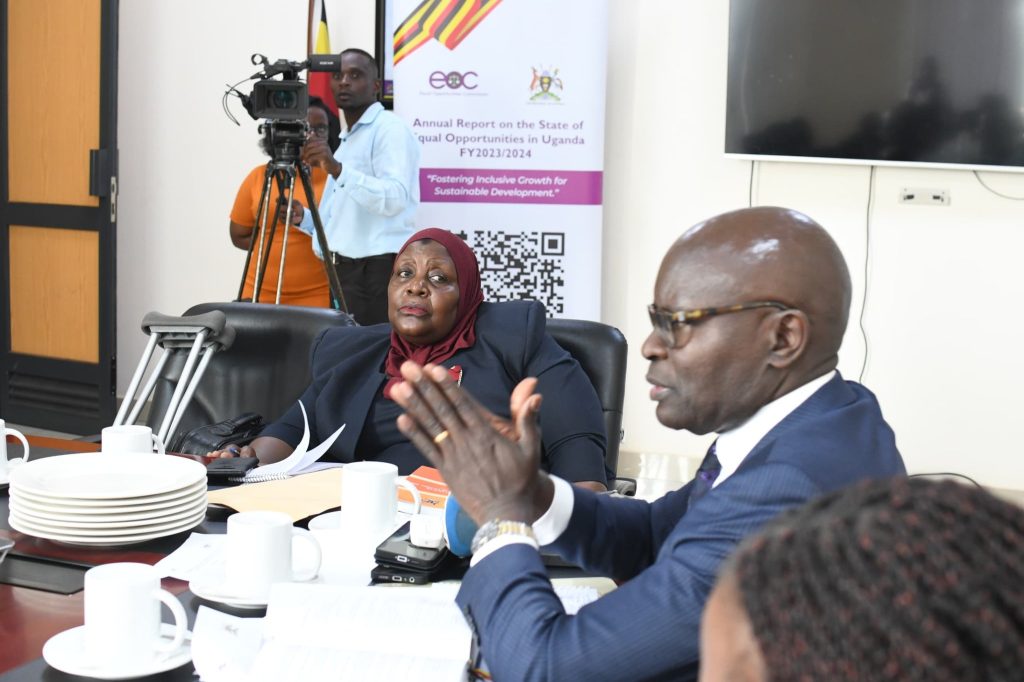
The Equal Opportunities Commission held an engagement with the Chairman of the Electoral Commission, Justice Simon Byabakama, at there head offices – Kingdom, Kampala. The discussion focused on enhancing inclusive political participation across the country.
During the engagement, the Chairman of the Electoral Commission, Justice Simon Byabakama, revealed that the government’s annual allocation of Shs300 million for voter education is grossly inadequate. “There is a general outcry that civic and voter education is lacking among the population,” he noted. Despite the limited funding, he said the EC has tried to fulfill its mandate by conducting public engagements through media and outreach programs.
“Our budget for voter education is only Shs300 million per financial year. What meaningful outreach can that achieve? Effective voter education requires direct interaction with the public you can’t demonstrate how to vote via radio,” Justice Byabakama emphasized. He stated that at least Shs3 billion is needed annually for impactful voter education campaigns.
He also stressed that, despite the financial constraints, the EC has not remained idle. Parish and sub-county supervisors have been conducting sensitization sessions to educate the public on electoral processes.
The EOC further questioned Justice Byabakama about the persistently low voter turnout during general elections.
In response, he attributed the problem to weak mobilization efforts by key actors in the electoral process, particularly political parties and candidates. “Low voter turnout is a serious concern. It results in wastage of public resources. Ballot papers are printed abroad using taxpayer dollars. When people don’t vote, they forfeit their constitutional right under Article 1,” he said.
Justice Byabakama appealed to all stakeholders to take responsibility for mobilizing citizens to vote. “We urge the public to encourage one another to participate on polling day,” he added. He also noted that, unlike in some developed countries where voting is mandatory, Uganda treats it as optional something that needs to be addressed to prevent wasteful spending.
The Commission also pressed the EC chairman on plans for special interest groups in upcoming elections.
Justice Byabakama responded that inclusive electoral processes are critical to free and fair elections. He assured the EOC that the EC has been engaging with various stakeholders to ensure that all groups are represented and involved.
On the issue of electoral violence, Justice Byabakama urged all participants in the electoral process to reject violence in all its forms. “Violence is avoidable it is often instigated by individuals without justification,” he said. He reminded the gathering that intimidation, assault, and hate speech during elections are criminal offenses. “Anyone using hate speech should be reported to the police and face the law. We call on all stakeholders to adhere to electoral laws and maintain tolerance.”
Shaft Nasser Mukwaya, Secretary to the Equal Opportunities Commission, urged the Electoral Commission to improve communication regarding elections for special interest groups.
“I’m glad you confirmed that these elections will begin next month. However, the information is not well disseminated. Only urban elite youth seem to be aware, while their rural counterparts remain uninformed,” he said, calling on the EC to enhance publicity.
Meanwhile, EOC Chairperson Safia Nalule Jjuuko recommended that the Electoral Commission establish a robust civic education framework.
She emphasized the need for comprehensive measures to prevent electoral violence and intimidation. “The Electoral Commission should put in place mechanisms that promote free and fair elections, ensuring all voters including those in electoral colleges for MPs and councilors of special interest groups are facilitated,” she concluded.





